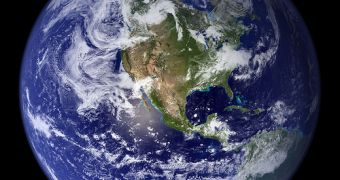Scientists previously estimated Earth's age at 4.537 billion years. More recently they have revised this statement by saying that the forming of the planet took a bit longer and Earth is actually 70 million years younger. Not that it makes a huge difference to the common mortal, but the way researchers got to this conclusion is quite interesting.
The technological evolution helps science shed some light on a few of the world's mysteries. One of them is our planet itself. Questions like where did it came from, how it was formed, and how much did all of this took, found their answers thanks to technological breakthrough and scientists' perseverance. In establishing Earth's age without any doubt, scientists compared elements from its mantle to those from meteorites believed to have formed the same time as the Solar System.
Apparently the shaping of the Earth from particles smashing into one another, took much longer than believed. “The collisions caused part of the planet to melt, and allowed metal to segregate to the center of the Earth to form the core,” said Dr John Rudge, from Cambridge University, UK, leader of the research.
Scientists studied two isotopes than can be found in the Earth's mantle, 182-hafnium and 182-tungsten. They said that after a few million years, hafnium transforms into tungsten. This latter moves to places where there is plenty of metal, like the core of the planet, leaving a trail in the mantle. After comparing the amount of 182-tungsten found in the mantle with the quantity found inside meteorites, scientists calculated the time it took the Earth to separate the mantle from the core.
For further confirmation of the results, the team looked at other two isotopes and calculated every single possible result. The general conclusion from all this is that at the beginning, the Earth formed relatively fast. Then there might have been a certain gap, ended by the impact that formed the Moon, followed by a slower growth of the planet.
“We estimate that makes it [Earth] about 4.467 billion years old - a mere youngster compared with the 4.537 billion-year-old planet we had previously imagined”, added Dr Rudge.

 14 DAY TRIAL //
14 DAY TRIAL //